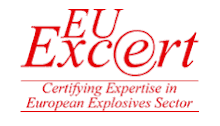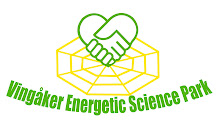Background
The manufacture and use of explosives, propellants and pyrotechnics underpins a significant part of the European Union economic and industrial activity. An understanding of explosives science and technology and the competence to harness it is central to maintaining European explosives capability, national security, and in sustaining a competitive European industry.
There is a perception and some evidence, that in Europe, competence levels in this key technological area are being eroded. In several member nations a high proportion of the most experienced and knowledgeable personnel are retiring or nearing retirement. Urgent efforts are therefore underway in some partner nations to replenish this expertise. 2003 Sweden together with United Kingdom, Norway, Finland and Italy started a Leonardo Da Vinci programme to develop a comprehensive framework which describes and categorizes the competences
of all workers engaged in the manufacture or use of explosives.
Examining the cause of explosive accidents often reveals that human error or failure is a major contributory factor. Effective explosives safety depends on people making the right decisions at the right time. It depends upon people having the necessary competence to carry out their jobs properly. The concept of competence is well recognised in EU safety management. Much of EU safety legislation calls for “competent people” in roles that affect safety. In the case of explosives, this will be in all stages of life, from the formulation of new explosives in the laboratory, through manufacture, storage, transportation, use and disposal.
However in several European countries a high proportion of the most experienced and knowledgeable personnel in the explosives industry are retiring or nearing retirement. It is therefore necessary to replenish this expertise in this key technology area.
Within the limits of the Leonardo programme the pilot project has developed a comprehensive framework which will describe and categorise all of the competencies of workers engaged in the manufacture or use of explosives. The competencies will be underpinned by a training and education programme which will identify the curriculum of subjects and topics and knowledge necessary to generate and develop the competencies. A range of products including workbased learning programmes, e-learning packages using both the Internet and CD-ROM, and conventional teaching materials has been developed and trialled in partner nations. The EUExcert programme is now expanding and a network and cluster are formed on EUExNet
torsdag 29 oktober 2009
måndag 27 juli 2009
Summary of the EUExNet project 2009-07-27
The EUExcert partnership has proposed a new Leonardo da Vinci Project which aims to
Start a European association and a network with independent national nodes (bodies), which will be licensed to use the EUExcert logo for certificates of explosive competence.
European Union, Education, Audiovisual and Culture Executive Agency Lifelong Learning: Leonardo da Vinci, Grundtvig and Dissemination, Unit P3 has awarded a grant to KCEM to create the Network organisation EUExNet.
KCEM will as contractor lead the work which initially includes partners from Czech Republic, Estonia, Germany, Italia, Latvia, Lithuania, Malta, Norway, Portugal, United Kingdom and Sweden
EUExcert will through the EuExNet continue the work to establish a transferable certificate of Explosive competence which will be recognised inside and outside EU.
EuExNet is based on the previous innovative ideas which has been developed in previous Leonardo da Vinci financed EUExcert projects.
The national nodes/bodies will be set up according to national prerequisites; however the national nodes/bodies should build their work on using the occupational standards proposed by the EUExcert project or use other adequate occupational standards – which can be recognised by the other EUExcert partners.
The independent national nodes/bodies elects/appoints two national representatives, whereof one representative is deputy, as members in the steering board of the independent association, EUExcert Europe (previously called the EUExcert Foundation).
The independent European association, EUExcert, will be operative when the National EUExcert nodes have signed of the agreement “Articles of incorporation”.
The head office of the independent European association, EUExcert, will initially be placed in Karlskoga with c/o address KCEM.
The EUExcert association aims to develop exchange programs for students and employees, between member organisations in Europe, thus realising the free movement of workers.
The independent national nodes/bodies (using the EUExcert trademark), have the task to award EUExcert certificates and are responsible for accrediting other awarding bodies.
EUExcert certificates will be issued to individuals in the explosives sector, based on a procedure of accreditation of individual competencies – no matter how the experiences, skills or competencies have been acquired – according to the occupational standards that have been chosen as best practice by the previous EUExcert projects.
The process of issuing certificates and accreditation of individual competencies will be carried out in a trial process, defined as a work package, in some of the participating nations, in order to monitor the process of issuing certificates and accreditation of competencies, and to evaluate the possibility to develop a standard for procedure, which other participating nations can follow.
Basic and/or supplementary training can be provided by external VET-providers, Universities or other private or public education institutions, and will not be part of the EUExcert III project, however individual competencies acquired during training can be accredited by the national nodes/bodies as part of the trial procedure.
The EuExNet (or EUExcert III) project will monitor and evaluate
(1) The work to set up national nodes/bodies and
(2) The procedures for accreditation and issuing of certificates at national nodes/bodies.
The framework for the application is based on the European commission’s ideas of making
Lifelong learning a reality for all citizens, which is defined as;
"all learning activity undertaken throughout life, with the aim of improving knowledge, skills and competence, within a personal, civic, social and/or employment-related perspective."
Lifelong learning can also defined more specifically towards vocational training, which is defined as;
“All learning activity undertaken throughout life, with the aim of improving knowledge, skills/competences and/or qualifications for personal, social and/or professional reasons.”
The ambition in the EuExNet project is to introduce a systematic approach to;
1. Lift the status of workers in the Explosives sector in order to
2. Attract younger people to work in the sector, in order to
3. Respond to the effects of demographic changes in the ageing workforce, and to
4. Introduce trajectories for career paths for workers, and to
5. Encourage individuals to continually improve their abilities, skills and competencies, where
6. Recognition of competencies can lead to develop a competitive European explosives sector and employable workers, and thus
7. Creating a learning environment and thereby realising the overall ambitions in the ideas of lifelong learning
The EUExNet project will commence the work 2009-11-01
For further information please contact hans.wallin @kcem.se
Start a European association and a network with independent national nodes (bodies), which will be licensed to use the EUExcert logo for certificates of explosive competence.
European Union, Education, Audiovisual and Culture Executive Agency Lifelong Learning: Leonardo da Vinci, Grundtvig and Dissemination, Unit P3 has awarded a grant to KCEM to create the Network organisation EUExNet.
KCEM will as contractor lead the work which initially includes partners from Czech Republic, Estonia, Germany, Italia, Latvia, Lithuania, Malta, Norway, Portugal, United Kingdom and Sweden
EUExcert will through the EuExNet continue the work to establish a transferable certificate of Explosive competence which will be recognised inside and outside EU.
EuExNet is based on the previous innovative ideas which has been developed in previous Leonardo da Vinci financed EUExcert projects.
The national nodes/bodies will be set up according to national prerequisites; however the national nodes/bodies should build their work on using the occupational standards proposed by the EUExcert project or use other adequate occupational standards – which can be recognised by the other EUExcert partners.
The independent national nodes/bodies elects/appoints two national representatives, whereof one representative is deputy, as members in the steering board of the independent association, EUExcert Europe (previously called the EUExcert Foundation).
The independent European association, EUExcert, will be operative when the National EUExcert nodes have signed of the agreement “Articles of incorporation”.
The head office of the independent European association, EUExcert, will initially be placed in Karlskoga with c/o address KCEM.
The EUExcert association aims to develop exchange programs for students and employees, between member organisations in Europe, thus realising the free movement of workers.
The independent national nodes/bodies (using the EUExcert trademark), have the task to award EUExcert certificates and are responsible for accrediting other awarding bodies.
EUExcert certificates will be issued to individuals in the explosives sector, based on a procedure of accreditation of individual competencies – no matter how the experiences, skills or competencies have been acquired – according to the occupational standards that have been chosen as best practice by the previous EUExcert projects.
The process of issuing certificates and accreditation of individual competencies will be carried out in a trial process, defined as a work package, in some of the participating nations, in order to monitor the process of issuing certificates and accreditation of competencies, and to evaluate the possibility to develop a standard for procedure, which other participating nations can follow.
Basic and/or supplementary training can be provided by external VET-providers, Universities or other private or public education institutions, and will not be part of the EUExcert III project, however individual competencies acquired during training can be accredited by the national nodes/bodies as part of the trial procedure.
The EuExNet (or EUExcert III) project will monitor and evaluate
(1) The work to set up national nodes/bodies and
(2) The procedures for accreditation and issuing of certificates at national nodes/bodies.
The framework for the application is based on the European commission’s ideas of making
Lifelong learning a reality for all citizens, which is defined as;
"all learning activity undertaken throughout life, with the aim of improving knowledge, skills and competence, within a personal, civic, social and/or employment-related perspective."
Lifelong learning can also defined more specifically towards vocational training, which is defined as;
“All learning activity undertaken throughout life, with the aim of improving knowledge, skills/competences and/or qualifications for personal, social and/or professional reasons.”
The ambition in the EuExNet project is to introduce a systematic approach to;
1. Lift the status of workers in the Explosives sector in order to
2. Attract younger people to work in the sector, in order to
3. Respond to the effects of demographic changes in the ageing workforce, and to
4. Introduce trajectories for career paths for workers, and to
5. Encourage individuals to continually improve their abilities, skills and competencies, where
6. Recognition of competencies can lead to develop a competitive European explosives sector and employable workers, and thus
7. Creating a learning environment and thereby realising the overall ambitions in the ideas of lifelong learning
The EUExNet project will commence the work 2009-11-01
For further information please contact hans.wallin @kcem.se
Prenumerera på:
Inlägg (Atom)










